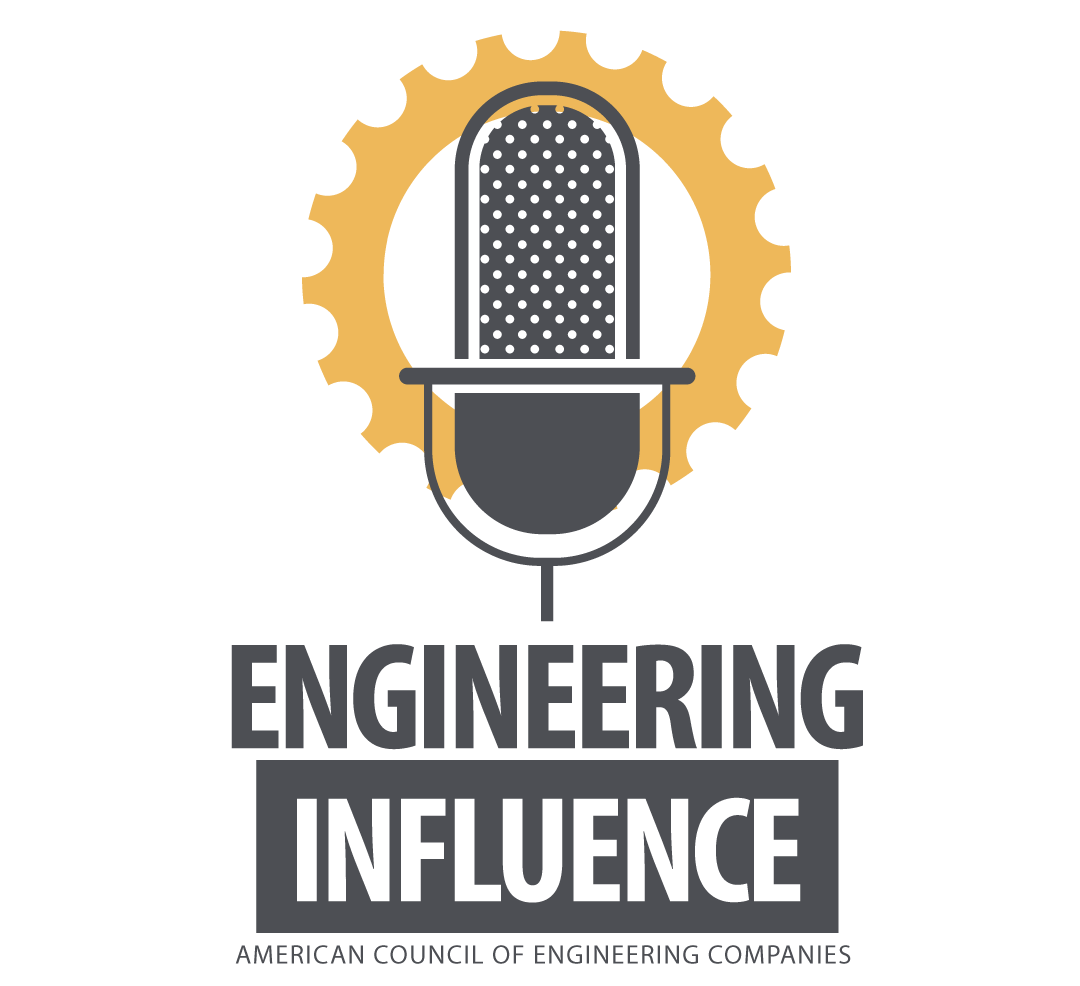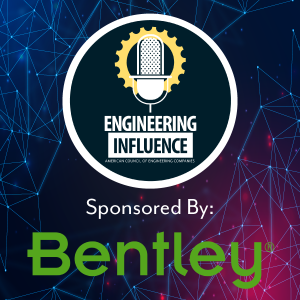
The Voice of the Business of Engineering
Engineering Influence is the official award-winning podcast of the American Council of Engineering Companies (ACEC).
ACEC is the trade association representing America's engineering firms; the businesses that design our built environment. Subscribe to the podcast for a variety of content ranging from interviews with newsmakers and elected officials to in-depth conversations on business trends, the economy, technology and what's next for the engineering and design services industry.
Visit us online at www.acec.org
Follow us on Twitter at @ACEC_National
ACEC reserves the right to moderate episodes on its channel and make editorial decisions on the inclusion or deletion of comments posted by listeners. Direct any questions to comms@acec.org.
Episodes

Thursday Jul 06, 2023
The Future of AI and Engineering with BST Global’s Javier Baldor
Thursday Jul 06, 2023
Thursday Jul 06, 2023
During the 2023 ACEC Spring Convention, we sat down with BST Global's CEO, Javier Baldor, to discuss the promise of AI and its potential impact on the business of engineering.

Wednesday Jul 05, 2023
A Look Ahead at the U.S. Economy
Wednesday Jul 05, 2023
Wednesday Jul 05, 2023
Thomas Grogan, ACEC's Senior Director of Economics and Private Markets joined the podcast to present a look ahead at the U.S. economy and the A/E sector.
During the podcast, Thomas referred to several PPT slides. To watch the video of the podcast, please visit our Youtube channel here.
To download the PPT, please go here.
Transcript:
Allison Schneider:
Welcome to Engineering Influence, a podcast from the American Council of Engineering Companies. My name's Allison Schneider, and I'm here with Thomas Grogan, our senior Director of Economics and Private Markets to discuss the economic outlook. Thanks for being with us.
Thomas Grogan:
Thank you so much, Allison. Very happy to be here. Very happy to be talking about the economic outlook and talk through some of the data that's been released recently and what it means for the engineering business.
Allison Schneider:
Where do you wanna start?
Thomas Grogan:
Well, if we go to our first slide, I kind of like starting by setting an overview of where we're going to, what we're gonna discuss. So we'll first go through some of the data around the engineering business specifically, and then we will get into some just a few data series looking at the U.S. Economy at large. So the first thing we'll start out with is the census release of quarterly survey data on our next slide, which shows the A&E revenues for the first quarter of 2023. And as you can see, it was a very good quarter, year over year growth was about 10 and a half percent totalling a little under 112 billion in revenue for the first quarter of 2023.
Allison Schneider:
What is driving this growth?
Thomas Grogan:
Yeah, so it's a great question. Really, it's coming from fiscal policy and programs like IIJA and a little bit of the IRA. A lot of money is being spent on programs aroundbridges, air airports, EVs, all that. And it's just starting to be deployed at the federal level, and there's a lot more funds that have not been released yet. So we can expect growth you know, for the next 12 to 24 months as more of that money hits the street, as they say.
Allison Schneider:
So what we're seeing now is that it's starting to deploy that money and we should be expecting this growth to continue.
Thomas Grogan:
Yeah. whether it'll be, you know, continued 10% year over year growth, hard to exactly tell, but it does not look like there would be declines in, you know, the next six to eight quarters. So that's a very good sign.
Allison Schneider:
Great.
Thomas Grogan:
And so then the next data point I want to talk about is the construction data that was released. Looking at the value of structures put in placewhat we see is that series is growing as well. Construction usually follows the engineering design work and the kind of lifecycle chain. And what we see is total construction grew about 7% year over year and totaled about $1.9 trillion. And you know, that growth is great. We could even see when we take a step back and look at the growth over the past few years, how much it's grown since COVID. When we go to the next slide though, I think it's important to note that the growth is not even across all the industries. So what we see here is that especially in the past 10 months or so, the non-residential private sector has really started to pick up.
Thomas Grogan:
And the residential growth, which really booms starting with the COVID pandemic, has, you know, declined a little bit and slowed down. And you really can see the point in around May, 2022 when residential spending starts to decline. That's essentially when the feds started raising interest rates, thus affecting mortgage rates. And so that industry is starting to feel a little bit of the you know, higher cost of borrowing. However, as we see on our next slide, the non-residential private construction is really picking up the slack. And when we look at the specific industries, we see that the largest growth by far is happening in the manufacturing sector. That has grown 82% year over year when we look at year to date spending. And that is expected to continue to be pretty strong into the future based on a lot of the fiscal policies that are in place as well.
Allison Schneider:
You talked about the fiscal policy. Can you talk about some examples of the manufacturing products that are driving this?
Thomas Grogan:
Yeah, so there's been a lot of emphasis on bringing a lot of the supply chain home, supply chain home, as well as the energy transition, critical resources. And this is being driven recently through a lot of funding as part of the IRA in the Department of Energy's loan program office. So these are mega projects. Most recent example announced last week is that Ford partnering with SK out of South Korea is doing about an 11 and a half billion ev multiple battery manufacturing facility as well as assembly plant in the, I believe Tennessee, Kentucky area. That's about $11.5 billion a DOE approved alone for $9.2 billion. So that's covering, you know, about 80% of the total project cost. And so it's these big mega projects could be something with respect to semiconductor fabrication as well. And that's happening a little more concentrated geographically compared to some of the other infrastructure spending, which is more, you know, along the lines of formula funding where states are getting an amount based on something like population.
Allison Schneider:
So what we're seeing again here driving the numbers is that investment in America from the federal government.
Thomas Grogan:
Yeah, absolutely. And especially with respect to the manufacturing, advanced manufacturing sector, what's powerful is that for, you know, the federal investment that is being spent, we're seeing on the private side developers, finances make up that difference to really move these projects along. So in the example of the Ford project, you know, the total cost was about 11 and a half billion. The federal government isn't investing or, you know, financing all of it, but they're financing a large portion of it. And then that difference is being made up by the private side. And so, you know, these are data points that show the strength of the engineering business, you know, in June, 2023. Now, obviously we are part of a larger economy, and so we'll kind of talk on a few items that I think are relevant just to, you know, us at large and that could have impacts for our business as well.
Thomas Grogan:
So when we look at our next data slide that we see, right, so a very hot topic, you know, outside the engineering industry is inflation and prices, how much things cost. And at the most recent Federal Reserve meeting, they kept interest rates the same. The data that they are looking at is showing that prices are coming down somewhat, but not enough that they would like however, it's not increasing. And so, you know, when we look at the price changes for different services, there's a lot of volatility, especially this time last year due to the energy and food costs. However, when we look at some of these data series such as the all items less food and energy, they are declining a little bit, but they're not down as much as the Fed would like. I believe that all items less food and energy is around 5% growth year over year.
Thomas Grogan:
Additionally in the U.S. economy, consumers, households actually spend a lot of their money on services. And so that's kind of what's driving or keeping prices higher today, not declining as much. You know, as we would like. And when we go to the next slide, I think it's important, you know, to talk about not just the inflation affecting the households, but what does this mean for our industry? And we could look at the different cost indexes for the construction and engineering firms. And what we see here is US dots highway cost index what the core CPI looks like, and ENR's material price index. And what we see is these inputs, the gray and black lines have grown significantly compared to just household costs. So the cost of building a bridge or constructing a new building is significantly higher than you know, this time a year ago, three years ago, five years ago.
Thomas Grogan:
The good news is this data series that we have is based on US DOT Highway Construction Cost Index only went back to 2022, quarter three. What we're seeing in other material costs indices is that prices have come down a bit from that, you know, summer 2022 peak. And then finally you know, I think something that's important to keep in mind, you know, what will happen with prices activity, if we look at how people are basically behaving now, that's a big, let's say, real time indicator of what's happening happening economically. So if we look at data on our next slide that looks at vehicle miles traveled and airline activity, what we see is we're about 90 to 95% of our pre COVID levels. So, you know, folks are traveling on their summer vacations or driving to the beach for, we have 4th of July coming up, things like that. That is kind of a good sign that we are almost, let's say back to normal in terms of, you know, life in America.
Allison Schneider:
What does back to normal mean when it comes to the economy?
Thomas Grogan:
Yeah, that's a great question. What it means is people are leaving their house and doing stuff. It could be going to work, it could be going shopping, it could be going to doctor's appointments. All these activities essentially have costs are, you know, functions of people wanting to either spend money or buy services that they need. This is often correlated with GDP growth, either positively or negatively. Last time we saw these travel activity metrics decline, say March, April of 2020, we also had negative GDP the previous time, especially with respect to airline activity. We saw these declines as with the financial recession in 2008, 2009 and also, you know, a bit of the 2000 tech bubble afterwards. So when people are going out and doing things, you know, there's not one answer. Some of it is, like I said, they have jobs to go to or they have work to do, which is obviously very good. But it's also, they feel confident to go out and spend money and do activities and things that they wanna do. And so with it being close to normal, it you know, points well that while a lot of talk is, is there a recession? Is things, are things gonna be terrible or not? I think it's fragile, but I think it's positive that we are seeing, you know, activity getting close to normal.
Allison Schneider:
And it sounds like a lot of the sentiment out there is that folks are worried about a recession, but their own situation doesn't feel quite so precarious. We see that both on the consumer side and also with the ACEC Research Institute. That's what their survey data shows as well.
Thomas Grogan:
Yeah, absolutely. But, and with the ACEC research data, what is very interesting, and I think the more important piece about what will happen over the next 6, 8, 12 months is that backlogs are high, if not higher depending on the firm size, which essentially a backlog is kind of how much business will you have over the next, you know, six months, nine months year. And with those not declining, you know, there's enough leeway to continue to grow and not have to worry about, you know, some sort of major crash around the corner.
Allison Schneider:
Positive information. Yes, absolutely. Good. Lots to look forward to. Lots to keep an eye on. Yeah. Thank you. Thanks for joining us. Thank
Thomas Grogan:
You so much, Allison.
Allison Schneider:
This has been another installment of Engineering Influence podcast from the American Council of Engineering Companies. Thanks so much.

Friday Jun 23, 2023
Future Proofing & Planning for Change
Friday Jun 23, 2023
Friday Jun 23, 2023
We sat down with Greg Kelly, CEO of STV and Chair of the ACEC Research Institute's Fundraising Committee to discuss the importance of strategic planning for A/E firms and STV's model for planning for the future. Before joining STV, Kelly served on ACEC's Planning Cabinet, where he was instrumental in developing the Council's existing strategic plan.

Wednesday Jun 21, 2023
Exploring the Risk Management Committee
Wednesday Jun 21, 2023
Wednesday Jun 21, 2023
We sat with Gresham Smith's Carl Munkel to discuss the hot issues being discussed by ACEC's Risk Management Committee during the 2023 Annual Convention and Legislative Summit.

Thursday Jun 15, 2023
A Conversation With NASA’s Charlie Blackwell-Thompson
Thursday Jun 15, 2023
Thursday Jun 15, 2023
We sat down with NASA's Launch Director, Charlie Blackwell Thompson, who won the 2023 Distinguished Award of Merit. The Award of Merit is ACEC’s highest award. It is bestowed on an individual for exemplary achievement in the field of engineering, pure or applied natural science, or an educator in one or more of these fields, either American or foreign. Previous recipients have included oceanographer and discoverer of the Titanic Robert Ballard and astronaut Neil Armstrong.
Charlie Blackwell-Thompson is NASA’s first female Launch Director and leads the launch operations for NASA’s Exploration Ground Systems and Orion’s first test flight, called Artemis I. Artemis is NASA’s robotic and human Moon exploration program and the first step in the next era of human exploration, establishing a sustainable presence on the Moon to prepare for missions to Mars.

Wednesday Jun 14, 2023
A Conversation with Economist Marci Rossell
Wednesday Jun 14, 2023
Wednesday Jun 14, 2023
At the 2023 Spring Convention and Legislative Summit, we sat down with keynote speaker Dr. Marci Rossell, former CNBC Chief Economist. We covered a wide range of issues, including how people's perceptions on the economy can actually result in that perception becoming a reality, as in the case of interest rates.
Snapshot of Dr. Rossell's Address:
Dr. Rossell told the convention audience that talk of a recession was premature and such fears will be history by the end of 2023.
“A recession requires a decline in economic activity spread across several sectors such as housing and unemployment, and that lasts six months,” she said. “In 2022, we had two consecutive negative quarters of GDPs (Gross Domestic Product) and the fears began.” She said consumer spending also must start to decline, but that also hasn’t happened.
“Has anyone flown this year? Were there a lot of empty seats? Of course not.”
The former host of the pre-market morning news show Squawk Box also emphasized that inflation is much more an economic negative than a recession, but even current inflationary impacts are starting to ease.
“Inflation peaked at 9 percent last year and the alarms went off,” she reflected. “The Feds raised interest rates 10 times over 18 months to address the increase. Since then, the rate of inflation has gone down about 1 percent each quarter. It should be back to its normal 2-3 percent range by the end of the year.”
She added that the economy today is vastly different than past years, such as with the U.S. becoming an oil producer now. “The result is that the global price of oil today has a net zero impact on our economy compared to 15 years ago.”

Monday Jun 12, 2023
What’s Ahead for the GEO Coalition with Andrew Pennoni
Monday Jun 12, 2023
Monday Jun 12, 2023
Incoming Geoprofessionals Coalition Chair Andrew Pennoni joined the podcast at the 2023 Annual Convention and Legislative Summit to discuss the year ahead for the Geo Coalition.

Tuesday Jun 06, 2023
EEA Spotlight: Stantec’s Bridging Kentucky Project
Tuesday Jun 06, 2023
Tuesday Jun 06, 2023
ACEC member firm Stantec won an Honor Award at the 2023 Engineering Excellence Awards for its "Bridging Kentucky" project, which replaced, repaired, or improved more than 300 structurally deficient bridges in the state. Wendy Harper with Stantec joined the podcast to discuss the project.
Stantec is also a sponsor of this year's EEA Awards.





